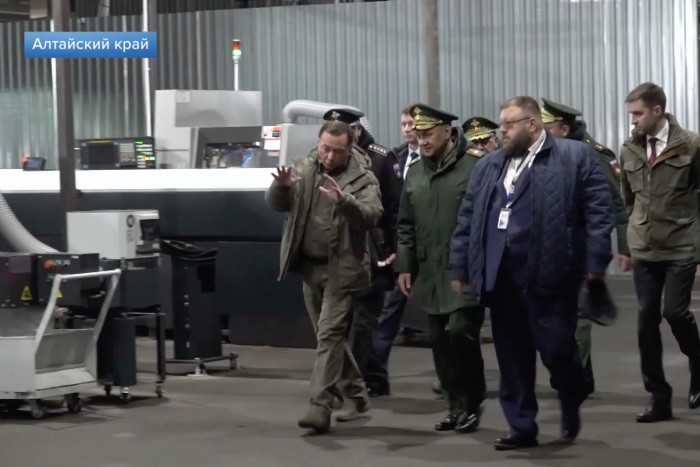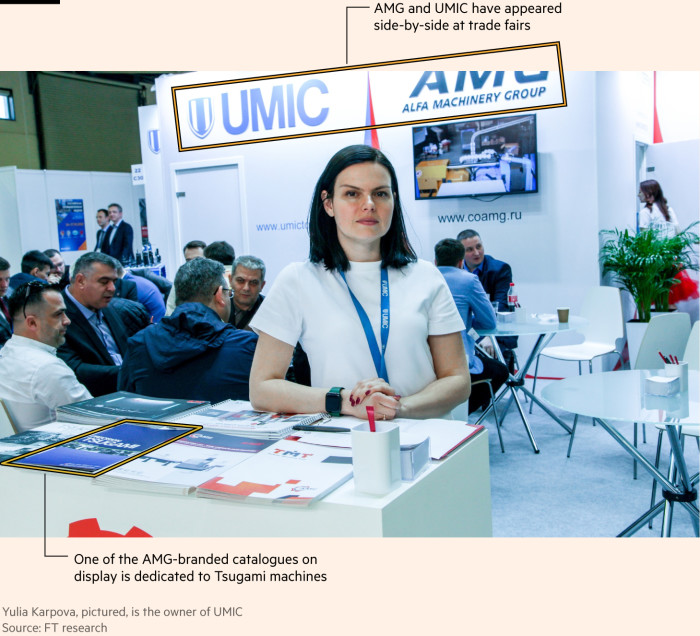Russia is looking to China for used machine tools using shadowy networks of buyers, as the Kremlin races to secure vital equipment to boost weapons production.
Moscow’s covert strategy for acquiring precision machinery, revealed by researchers, attempts to circumvent increasingly restrictive Western sanctions and export controls aimed at limiting production for the military.
The operations, which run through networks of opaque companies, use stocks of older, high-end machine tools made by Western companies that remain in China after decades of being sold to local factories.
The Center for Advanced Defense Studies (C4ADS), a Washington-based think tank that identified the shadow trade, said the complex sourcing arrangements suggested that Moscow’s claims of high-precision instruments made in Russia were likely “exaggerated”.
Allen Maggard, a C4ADS analyst who led the machine tool report, said Russian arms manufacturers are “trying to expand their production capacity with whatever they can get their hands on.”
One supply network, identified by C4ADS and verified by the Financial Times, is based around Moscow-based AMG, a Russian military supplier that was sanctioned by the US last year.
Since the Russian invasion of Ukraine in 2022, AMG has increased imports of Computer Numerical Control (CNC) tools made by Tsugami, a top Japanese machine tool manufacturer based in Tokyo. CNC tools are essential for defense industrial work because they enable automated high-precision, high-speed metal handling and milling.
Public filings show that AMG held contracts to acquire machine tools for Kometa, a company that develops weapons systems for Russia, including a ballistic missile defense system, jet weapons and missile systems, according to sanctions lists.
Tsugami machines have been identified in use in various military installations. Sergei Shoigu, then Russia’s defense minister, was shown on state television in March in front of what appears to be a Tsugami machine at a factory in Altai that makes parts for cruise missiles.
Customs documents show that AMG bought the Tsugami device in 2021 for around $600,000 from an official Japanese supplier. Post-invasion purchases then rose to $50 million in 2023, with all of the increase coming from two shadow middlemen.
The first supplier, Amigino, is an American supplier based in the United Arab Emirates, whose website was initially hosted on servers in Russia. It is owned by Andrey Mironov, according to Diligencia, a corporate intelligence company; no further details about Mironov’s background are available.
The other is ELE Technology, which fraudulently presents itself as “a division of Gray Machinery Company”, an American distributor of machine tools.
ELE’s website — which appears to be ripped from the actual Gray Machinery website — claims to have a warehouse in Illinois and offers potential customers lifts from Chicago O’Hare Airport. The site claims that Glenn and Jared Gray, two experienced American CNC tradesmen, are members of their team.
But ELE Technology is actually based 7,800 miles away in Shenzhen, China. Glenn Gray, whose full biography and photos are published on the ELE website, told the FT he knew nothing about the company.
Website registrations and old promotional materials indicate that ELE is run by a Chinese electronics trader named Benson Zeng. Zeng did not respond to requests for comment.

Tsugami told the FT that it did not supply any goods directly to ELE. According to the ELE website, it currently sells two used Tsugami machines that were manufactured in 2001 and 2005.
“We are witnessing the importation of decades-old machine tools into Russia,” Maggard said. “This speaks to the lack of conformity in the used market, not to mention the fact that manufacturers are unlikely to care about where their products end up after being sold.
“Just because a machining center is two or three decades old doesn’t mean it can’t make simple weapon parts.”
The two companies have different roles in Russian procurement. Amigino is an intermediary that commissions Chinese suppliers such as ELE to ship goods to Russia from China. The two worked together: documents obtained by C4ADS show that Amigino arranged for ELE to ship $2.7 million worth of goods to Russia in early 2023.
Tsugami has relied on the Chinese market for about 20 years. One person connected to the company estimated that there are more than 100,000 Tsugami machines in China out of 200,000 worldwide. It’s a group that Moscow has targeted since official Tsugami machine dealers pulled out of Russia in 2022.
“Before the pandemic, Tsugami was trying to take advantage of China’s national strategy to become a manufacturing powerhouse,” said an investment security analyst who reviewed its facilities in China. In 2023, more than 60 percent of Tsugami’s sales were in China.
However, the volume of machines in China is not just an export control problem that Tsugami presents. Customs records show another Russian company, UMIC, acquired machine tools and parts made in countries including Israel, Japan, Korea, Germany, Sweden and Switzerland for $2.9 million. In all cases, the device was shipped from China and purchased in yuan through business partners based in China.

Unlike AMG, UMIC was not sanctioned by the US. The owner of UMIC, Julia Karpova, shares a married surname and phone number with Evgeny Karpov, the owner of AMG.
She appeared at Russian trade fairs promoting AMG materials about the combination of AMG-UMIC stands. In May 2022, after Japan increased its export controls, she was photographed with AMG brochures advertising a range of Tsugami products that AMG claimed it could acquire.
UMIC and AMG did not respond to a request for comment.
Japan’s trade ministry said it was working with G7 partners to strengthen anti-sanctions circumvention measures. “While many countries are trying to deal with used products, Japan is collecting various information, including bypass companies,” the ministry said. “We would add them to the list of sanctioned entities as needed.”